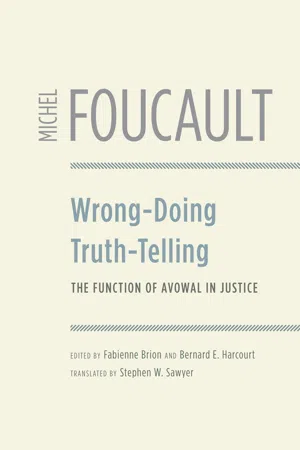
eBook - ePub
Wrong-Doing, Truth-Telling
The Function of Avowal in Justice
- English
- ePUB (mobile friendly)
- Available on iOS & Android
eBook - ePub
Wrong-Doing, Truth-Telling
The Function of Avowal in Justice
About this book
Three years before his death, Michel Foucault delivered a series of lectures at the Catholic University of Louvain that until recently remained almost unknown. These lectures—which focus on the role of avowal, or confession, in the determination of truth and justice—provide the missing link between Foucault's early work on madness, delinquency, and sexuality and his later explorations of subjectivity in Greek and Roman antiquity.
Ranging broadly from Homer to the twentieth century, Foucault traces the early use of truth-telling in ancient Greece and follows it through to practices of self-examination in monastic times. By the nineteenth century, the avowal of wrongdoing was no longer sufficient to satisfy the call for justice; there remained the question of who the "criminal" was and what formative factors contributed to his wrong-doing. The call for psychiatric expertise marked the birth of the discipline of psychiatry in the nineteenth and twentieth centuries as well as its widespread recognition as the foundation of criminology and modern criminal justice.
Published here for the first time, the 1981 lectures have been superbly translated by Stephen W. Sawyer and expertly edited and extensively annotated by Fabienne Brion and Bernard E. Harcourt. They are accompanied by two contemporaneous interviews with Foucault in which he elaborates on a number of the key themes. An essential companion to Discipline and Punish, Wrong-Doing, Truth-Telling will take its place as one of the most significant works of Foucault to appear in decades, and will be necessary reading for all those interested in his thought.
Frequently asked questions
Yes, you can cancel anytime from the Subscription tab in your account settings on the Perlego website. Your subscription will stay active until the end of your current billing period. Learn how to cancel your subscription.
No, books cannot be downloaded as external files, such as PDFs, for use outside of Perlego. However, you can download books within the Perlego app for offline reading on mobile or tablet. Learn more here.
Perlego offers two plans: Essential and Complete
- Essential is ideal for learners and professionals who enjoy exploring a wide range of subjects. Access the Essential Library with 800,000+ trusted titles and best-sellers across business, personal growth, and the humanities. Includes unlimited reading time and Standard Read Aloud voice.
- Complete: Perfect for advanced learners and researchers needing full, unrestricted access. Unlock 1.4M+ books across hundreds of subjects, including academic and specialized titles. The Complete Plan also includes advanced features like Premium Read Aloud and Research Assistant.
We are an online textbook subscription service, where you can get access to an entire online library for less than the price of a single book per month. With over 1 million books across 1000+ topics, we’ve got you covered! Learn more here.
Look out for the read-aloud symbol on your next book to see if you can listen to it. The read-aloud tool reads text aloud for you, highlighting the text as it is being read. You can pause it, speed it up and slow it down. Learn more here.
Yes! You can use the Perlego app on both iOS or Android devices to read anytime, anywhere — even offline. Perfect for commutes or when you’re on the go.
Please note we cannot support devices running on iOS 13 and Android 7 or earlier. Learn more about using the app.
Please note we cannot support devices running on iOS 13 and Android 7 or earlier. Learn more about using the app.
Yes, you can access Wrong-Doing, Truth-Telling by Michel Foucault, Fabienne Brion,Bernard E. Harcourt, Stephen W. Sawyer in PDF and/or ePUB format, as well as other popular books in Philosophy & Philosophy History & Theory. We have over one million books available in our catalogue for you to explore.
Information
Index of Notions and Concepts
absence, 75, 96, 138, 190, 206, 212
absolve, 61, 185, 186, 190
abuse, 76
accusation, 41, 62, 65, 72, 73, 111
accuse, 22, 44, 65, 72, 74n*, 98, 111, 202, 203, 227, 228, 275
accused, 41, 111, 202, 203, 204, 205, 208
accuser, 41, 202, 203
act, 12, 41, 44, 76, 92, 97, 100, 105, 109, 112, 117, 124n41, 138, 139, 140, 144, 145, 148, 157n28, 165, 173, 182, 182n*, 186, 192n1, 196n26, 207, 221, 223, 224, 227, 228, 231n12, 260, 273, 282, 310; of absolution, 188, 190; of avowal, 15, 191; criminal, 213; of faith, 106, 166, 188; of memory, 99; speech act, 14; of truth, 191, 297; verbal, 4, 17, 141, 167, 183, 189, 190, 191, 210
action, 13, 23, 60, 84n23, 84n25, 92, 95, 97, 100, 116, 132, 139, 143, 145, 150, 159n45, 174, 187, 198n29, 243, 261, 280; divine, 60
activity, 74n*, 101, 110, 133, 138, 149, 174, 244, 260, 279, 285
actus, 109
adversary, 27, 37, 46, 47, 48, 49, 51n4, 52n19, 52n31, 89n80, 202
aeikinētos, 146
agonistic, 30, 31, 32, 47, 49
akouein, 140
alcoholism, 218
alethur...
Table of contents
- Cover
- Copyright
- Title Page
- Dedication
- Contents
- Editor’s Preface
- Inaugural Lecture
- First Lecture
- Second Lecture
- Third Lecture
- Fourth Lecture
- Fifth Lecture
- Sixth Lecture
- Interview with André Berten
- Interview with Christian Panier and Pierre Watté
- Interview with Jean François and John de Wit
- The Louvain Lectures in Context
- Acknowledgments to the French Edition
- Acknowledgments to the English Edition
- Notes
- Index of Notions and Concepts
- Index of Proper Names